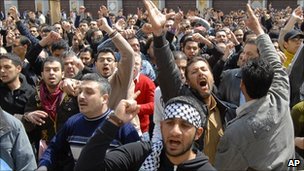 Liz Sly, who was recently inside Syria, writes for The Washington Post:
Liz Sly, who was recently inside Syria, writes for The Washington Post:
That ordinary Syrians have braved bullets and tanks to take to the streets for 18 consecutive weeks seeking the ouster of President Bashar al-Assad is an indicator of their movement’s resilience. Courage is one quality the protesters do not lack.
Just about every other ingredient that usually goes into building a revolution — organization, strategy or leadership — is still missing, however.
The nationwide uprising that erupted spontaneously on the streets of Syrian cities remains a largely ad hoc affair, inspired by the revolts in Egypt and Tunisia, driven by anger and frustration with decades of dictatorship, but lacking a clear direction or structure beyond the unanimous demand that Assad should go.
“This is the purest people’s revolution there ever was,” said a Damascus-based activist who is affiliated with two of the groups engaged in encouraging protests. Leaders are nonexistent, he said, and they wouldn’t be welcomed. “Anyone who puts his head above sea level is taken down,” he said.
As the weeks turn to months with no sign that either side is prepared to give way, the question of how the protesters will translate their momentum into concrete steps to replace the regime — and who will do it — is gaining urgency. The United States and other world powers are increasingly distancing themselves from Assad, while a growing number of think tanks and experts are becoming convinced that his regime will not survive.
At the same time, scattered incidents of sectarian violence in some protest flash points, such as the city of Homs, have focused concerns on the risk that the unrest in Syria could degenerate into chaos and civil war should the regime fall suddenly without a transition plan in place.
Officially, the United States is adopting a hands-off position, saying it is up to the Syrian people to determine their future. But behind closed doors, “a lot of people are obsessed with this issue”, said Andrew Tabler of the Washington Institute for Near East Policy. “As the regime degrades, the necessity of the opposition coming together grows.”
Efforts by exiled opponents of Assad to form a united front have faltered, in part because of an acute awareness that the Syrian street is driving the uprising. No one, least of all the Syrians, said a Western diplomat in Damascus, wants to see a repeat of the Iraq experience, in which exiled leaders with no street credibility are foisted upon those living inside the country.
Yet such is the severity of the crackdown that the real protagonists of this youthful revolt cannot gather to strategize, debate the way forward or select representatives. An attempt to link a conference of exiles in Istanbul with an assembly of domestic opponents in Damascus this month was abandoned because security forces surrounded the site and killed demonstrators the day before, making it too dangerous for participants to attend.
Youth activists inside Syria say that in any case they are too focused on organizing the protests while evading arrest to find time to address the future. Operating as tightly knit groups with names such as Trust Circle, the Syrian Creative Revolution, and the Revolution of Syrian Youth, they communicate in code, know one another by fake names and exist largely on the Internet.
Countless such groups exist around the country, and while they say they do not compete with one another, neither do they coordinate. And even these groups acknowledge that they play only a minor role in fomenting protests, which are sustained for the most part at the local community level by the grievances of ordinary citizens, or by the convictions of people such as the young professional in Damascus who has participated every Friday since March in the demonstrations held in the central neighborhood of Midan.
Nobody tells him that there will be a demonstration, nobody encourages him to go. He just shows up with a group of friends, assuming there will be a demonstration because there always is.